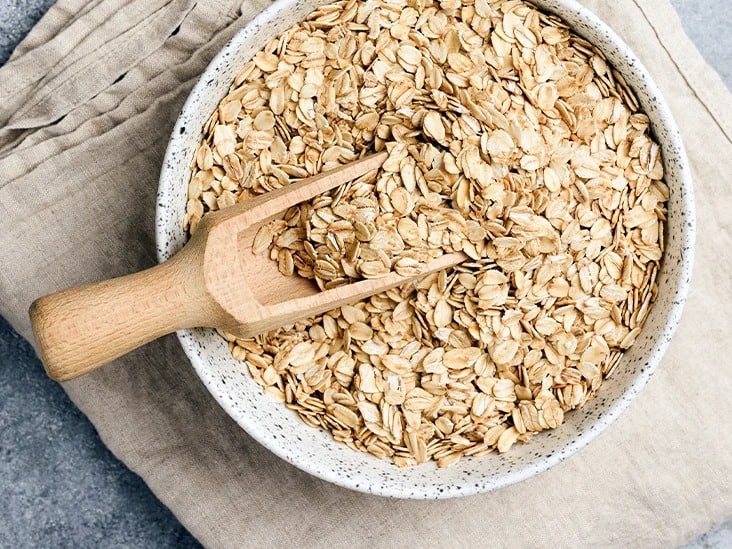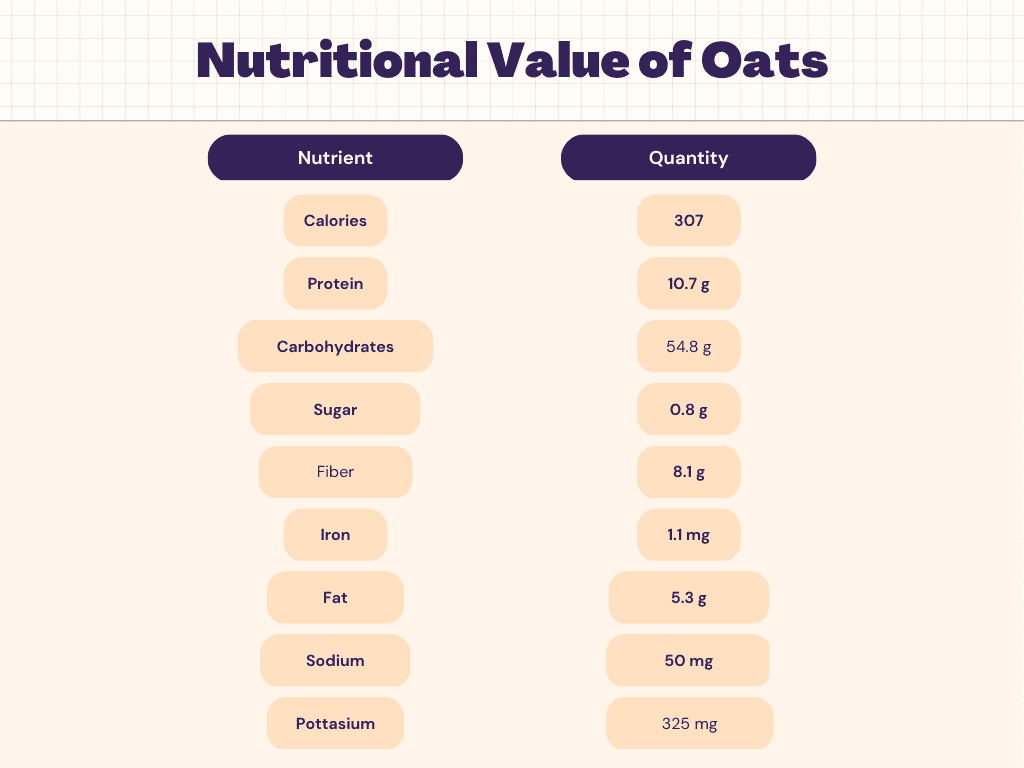The most complete and full type of oats, groats, take a while to cook. Because of this, the majority of consumers favor rolled, crushed, or steel-cut oats. The type of instant (quick) oats has undergone the highest processing. Although they cook in the lowest amount of time, the texture could be mushy. Oatmeal, which is created by cooking oats in water or milk, is frequently used as a breakfast food. Porridge is another name for oatmeal. Additionally, they are frequently used in cookies, granola bars, muffins, and other baked foods. One of the world’s healthiest grains is oats. They include significant amounts of essential vitamins, minerals, fiber, and antioxidants and are gluten-free whole grains.
Nutritional Value of Oats
Nutritional Facts of Oats
Carbs
6.8 grams of the 68.3 grams of carbohydrates in one cup of oat flour come from fiber.
Fat
Oats are a low-fat food as well. The percentage of calories from fat in oat flour is under 10%. But compared to other whole grains, oats have a higher fat content.
Protein
You might naturally draw towards animal products and legumes when seeking for high-protein foods. With 15.3g of protein per cup, whole grains like oat flour can also help you meet your daily protein needs.
Calories
Oat flour has 420 calories per cup. Oats are a calorie-dense meal, so consuming a lot of oat-based goods would be necessary to consume a lot of calories.
Health Benefits Of Oats
- Helps with weight loss – Oats are a nutritive and generally low-calorie food, despite the fact that there are numerous factors that affect weight reduction. Oats’ high fiber content boosts satiety and energy levels, which can help with weight loss. Check our Weight Loss Plans.
- May help with diabetes – Consuming whole grains has been linked to improving type 2 diabetes management. Check our Diabetes Plans.
- Increases energy levels – Oats make you feel fuller and maintain energy levels for longer by increasing satiety and lowering energy intake.
- Helps with cardiovascular health – LDL cholesterol, non-HDL cholesterol, and apolipoprotein B are three markers of cardiovascular risk that are decreased by eating oats.
Vitamins & Minerals in Oats
Oats include a lot of vitamins and minerals, such as:
- Manganese.
- Phosphorus.
- Copper.
- Vitamin B1
- Iron
- Selenium
- Magnesium
- Zinc
The Bottom Line
In conclusion, oats are frequently consumed for breakfast (porridge). Oats are more protein and fat than most other grains, yet they are also heavy in carbohydrates and fiber. They contain high levels of numerous vitamins and minerals. Avenanthramides are one of the potent antioxidants found in oats. These substances might lower blood pressure in addition to offering other advantages.
FAQs
How many oats can I eat in a day?
Oatmeal should normally only be consumed in two servings per day. Oatmeal has a lot of calories, which increases the risk of weight gain and can cause digestive problems including gas and bloating.
Should I eat oats before or after exercise?
It has been demonstrated that eating oats right before working out significantly improves exercise performance.
What are the benefits of Oats?
- helps with weight loss
- helps with diabetes
- helps with immunity
- helps increase energy levels
- helps with cardiovascular health
What is the best time to eat Quinoa?
You can eat quinoa for breakfast, lunch, or dinner at any time. However, it is better to have a healthy meal before bed, like quinoa. It causes sleep because, as a result of its high magnesium and protein content, it relaxes the muscles. “ One to two cups of cooked quinoa can be consumed each day.










